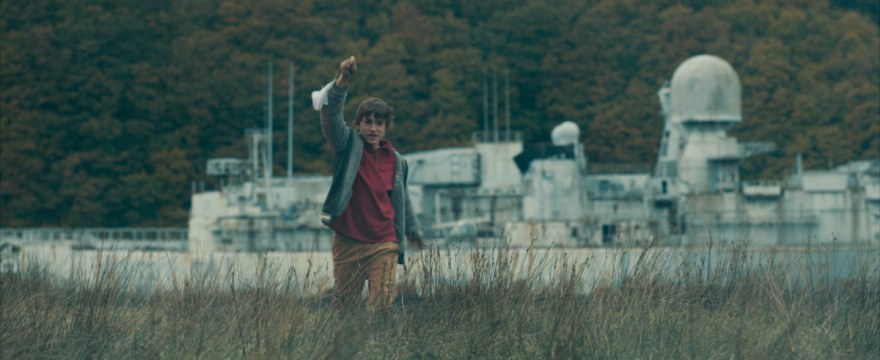Night cap with Cabane (A Tree House)
Interview with Simon Guélat, director of Cabane (A Tree House)
In Cabane, you explore social behaviors and initiatory “tests”. Your characters are also in search of themselves. Do you think that cultural rituals can help to build one’s identity? Is it up to each person to create their own?
Yes, I’m interested in our ability to re-enchant the world, and to transcend it. How thought is capable of transforming reality. It is what we put in, what we invest, that gives value to things. I believe strongly in the value of symbolism. When we are invested in what we do, certain apparently useless acts can be of decisive importance and provide meaning or help us in life. In A Tree House, I tried to be on the characters’ side, especially Denis’, and to show his subjective viewpoint. So, it was important that the treehouse and the surroundings, that bubble in the middle of a desolate military landscape, seemed visually beyond this world, like a utopia or a dream. For Denis, sleeping alone there will doubtlessly allow him to pursue this project and his desires, to explore, confront his fears, in order to be able to move forward.
Why were you interested in the period of adolescence?
It is a pivotal moment with lots of possibilities: to follow the well-worn path, or to break off. It takes courage to dare to explore elsewhere, to listen to what seems to be true. It’s a big risk and we can lose a lot on the journey. Denis is a forerunner. He isn’t following a model, but dares to free himself from the common way of perceiving things and follows and develops his desires.
In Cabane, your teenagers play at opposing authority… what does this relationship with the “adult” world bring to the film?
The military world that surrounds them embodies authority, so it is also the world of adults, at what perhaps may be its most absurd and meaningless. This young group plays with army regulations, bending the rules and making something beautiful from this. This is the case with their mud fight, or the misuse of the flares. The military zone is perhaps not very interesting in itself, but it becomes interesting through the eyes of these youth. We can say it’s almost a fantasy, because they never actually meet any real soldiers. And when they finally do, it’s not necessarily as they had imagined it, at least not for Denis.
How did you manage to return to this age with realism and sincerity? What was your approach in the preparation of this film and in your work with the young actors?
The context of the story is autobiographical. I was born in Switzerland in a village surrounded by a military area. My familiarity with this helped me to write the scenario. For the shooting, I tried to keep my distance from this and filmed the actors I had chosen, trying to capture their uniqueness. One issue was that we had to believe this group. So, we spent several days together in the countryside before the shoot, not for rehearsal, but just so they could get to know each other. We made a fire, roasted marshmallows, shot off some flares and tried out the mopeds. It was important that they had a common history before shooting the film. The camera feels that, no more need to think consciously about it, it becomes instilled…
What do you like about the forest environment and the symbol of the tree house?
I like the fact that it took so much effort to build the tree house, but once finished, how do we live in it? The project, it’s the construction, not the result. When the film starts, they decide to inaugurate the tree house, hence they celebrate the end of something without really realizing it. I love this paradox. At the end of the film, the treehouse is nothing more than a wreck, like the military boats that surround it. It served its function, Denis can leave it there, like a mark, already a memory. The forest is a very rich projection space. It seems soft and reassuring during the day and when Denis finds himself there at night, it is much stranger, almost terrifying. There is something mythical that reminds us of our basest fears, of our childhood.
Any cinematic coups de cœur in the past year you’d like to tell us about?
I don’t really like lists, the top 5. Sometimes it’s simply a shot or a glance from a film that stick with us. Anyways… But I can say for example that I really liked Staying Vertical by Alain Guiraudie. His films in general are an inspiration to me. I find them really free, he creates mental landscapes where fantasy has a chance to express itself. I can also find that with Joao Pedro Rodriguez, who I also like very much.
If you’ve already been to Clermont-Ferrand, could you share with us an anecdote from the festival? If not, what are your expectations for this year?
A Tree House is my very first film. I am a trained actor and did not go to a film school. So, it is with great joy that The Tree House has a life in a festival, and especially at this one, in Clermont-Ferrand. I am happy that so many viewers will be able to see it, each in their own way, which is what brings a film to life.
Are there any other screenings scheduled?
It will be shown on Arte, in the special Clermont-Ferrand Court-Circuit program on 8 February 2017 (Editor’s note: see Clermont dans la lucarne, festival special 2017). The film was selected for the Rennes Travelling Festival, 9-14 February.
Cabane is being shown in National Competition F8.








